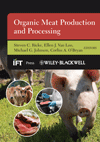OKLAHOMA CITY — A product development strategies workshop was part of the educational sessions at the American Meat Science Association's 2024 Reciprocal Meat Conference in Oklahoma City.
Panelist Shelly Thobe, director of culinary innovation for Wendy’s, said consumers are continually changing and that product developers need to be comfortable with the degree of uncertainty that entails. For Wendy’s, customers are not only restaurant patrons but franchisees as well, she said.
She said that technology has helped remove the need for expensive market testing.
“Our finance team is able to do a lot more modeling,” Thobe said.
She said that consumers’ ready access to all sorts of information has speeded up the product development process, from two years to six months.
“Right now consumers are very price conscious,” she said. “As we are working with our suppliers, I can tell you that the first thing we do is get them a price point so that they know what they have to target when they are delivering product to us.”
Identifying, evaluating and engaging suppliers is crucial for developing high quality retail products that meet Sam Club members’ needs, said panelist Jesse Collins, director of product development and sourcing-meat and seafood for Sam’s Club.
He said Sam’s Club’s product development focus is on private-label products for the club store’s Member’s Mark brand, and that ensuring the brand’s equity depends on building and nurturing the right supplier relationships.
“We want to make sure that when we are looking at items, that we are focused on bringing the best items we can to our members, and it starts with the supplier community,” he said.
Collins said that developing a new product follows a timeline:
- discover
- align
- develop
- approve
- distribute
- assess
He added that product development considerations for Sam’s Club Member’s Mark products also include:
- formulations
- raw materials
- claims
- packaging
- shelf life
- sustainability
- sensory/member acceptability.
“Before we even start on an item we have say, ‘What do our members want?’ – that’s our ask,” Collins said.
“The member – our customer – is the one that tells us how to be better product developers,” he added.
Panelist Devon Cameron-Nubbie, senior manager of R&D for Simmons Foods, said developing new products requires focus on the customer, the product and execution.
“Consumers pay with both their money and their brand loyalty,” she said.
Product developers need to keep in mind who the customer is, whether the end-user or manufacturing partner, Cameron-Nubbie said.
Panelist Wes Frierson, vice president-digital solutions for FoodChain ID, said product developers are using AI and predictive modeling to accelerate the process and improve outcomes.
Model-based approaches can save weeks of development time, advise on recipe design, optimize outcomes, and predict performance, sensory profiles and consumer feedback, and shelf life, Frierson said,
He said generative AI can be a “confident liar” and results should be treated as advice and not gospel.

.png?height=96&t=1647275041&width=96)






